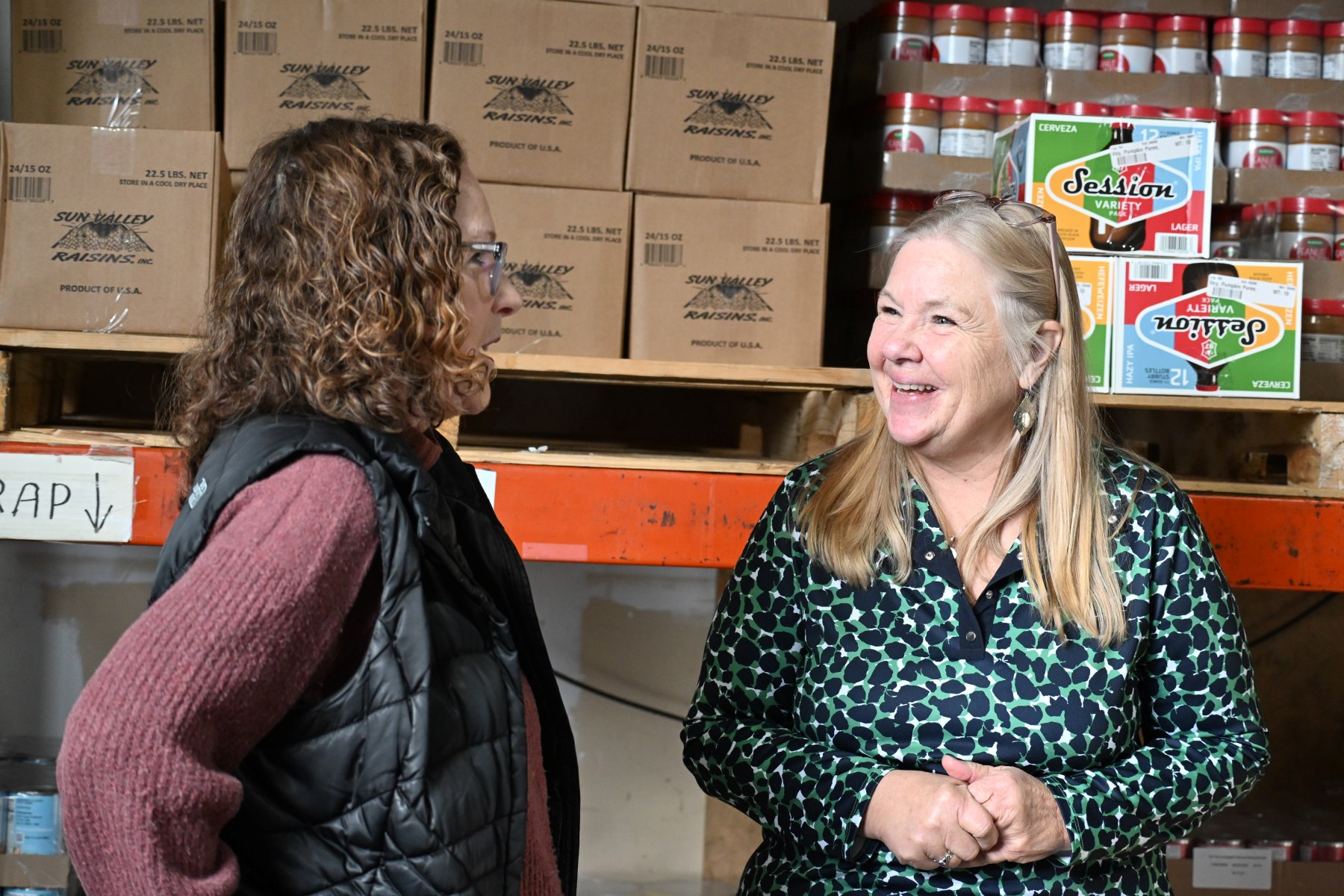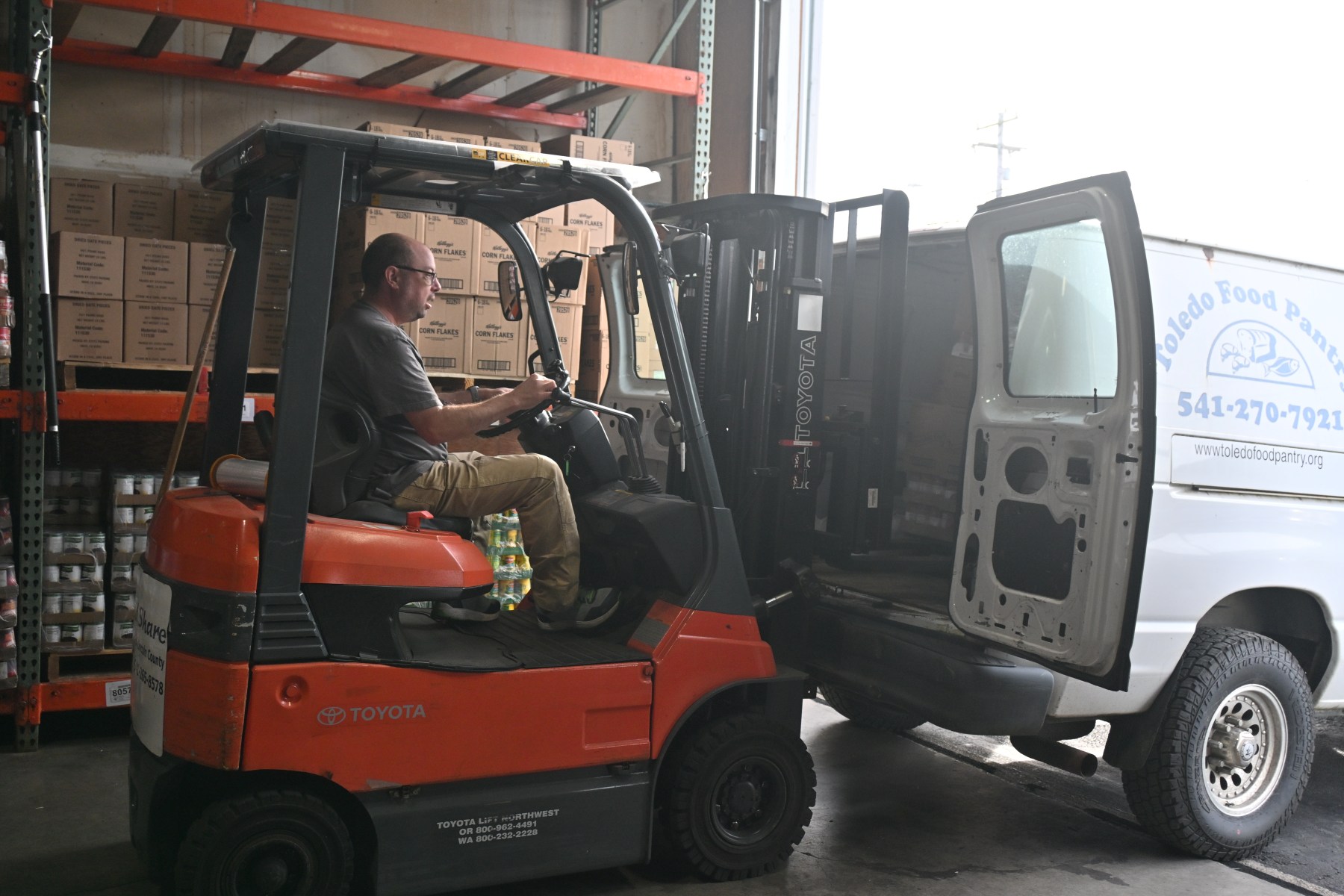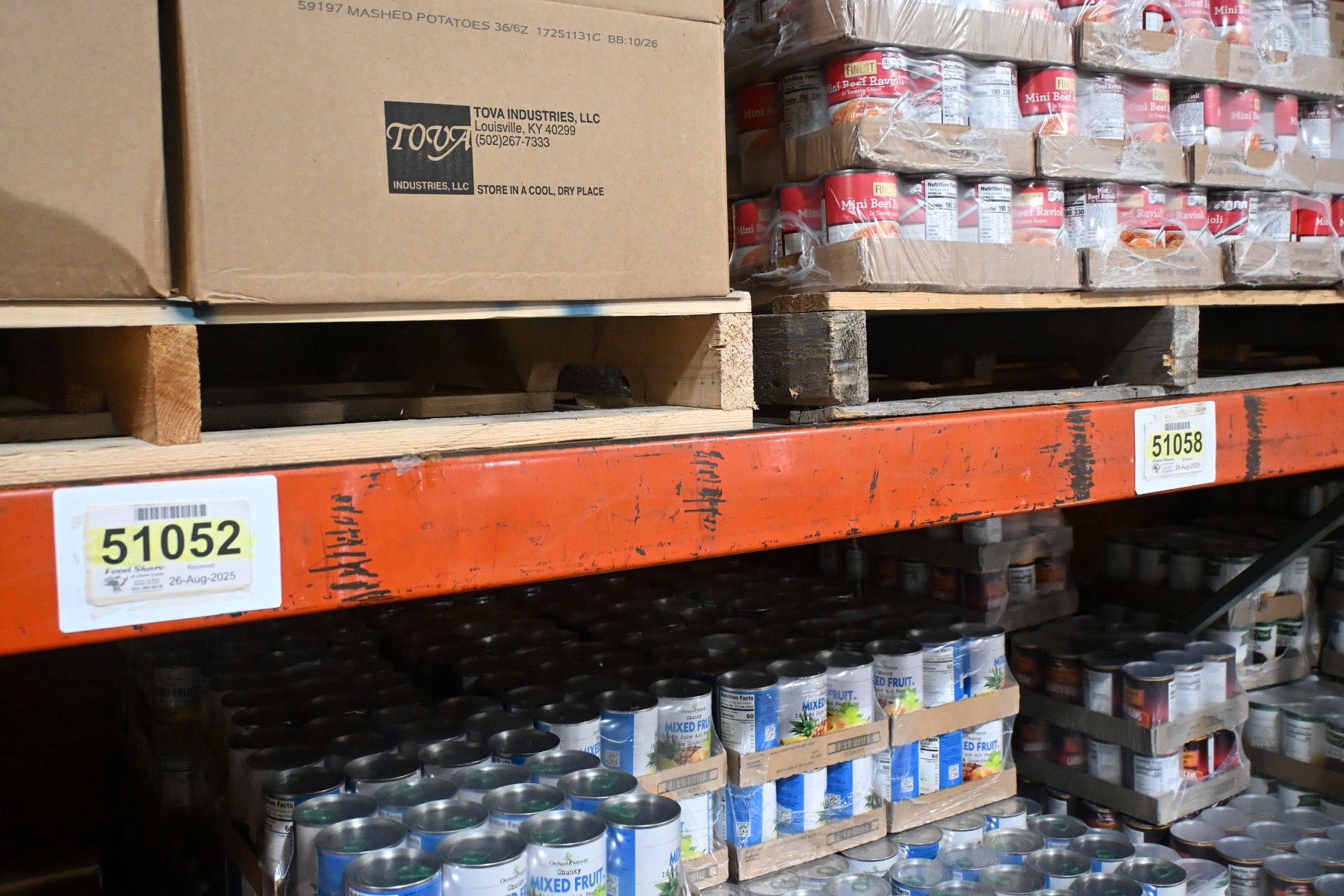
- Friday update: A federal judge in Boston ruled Friday that the U.S. Department of Agriculture’s plan to pause a food assistance program for 42 million people was illegal — but gave the Trump administration until Monday to respond to her finding before she decides on a motion to force the benefits be paid despite the ongoing government shutdown.
By SHAYLA ESCUDERO/ Lincoln Chronicle
NEWPORT – By the end of this week, more than 4,450 households in Lincoln County could lose access to federal food assistance.
Food Share of Lincoln County, which supplies eight local food pantries and three meal sites, is bracing for the impact.
Inside the organization’s Newport warehouse on Thursday, staff loaded goods from the distribution site to a van bound to Toledo’s food pantry. Boxes of juice, jars of peanut butter and cans of beans, tomato sauce and fruit lined the shelves.
It’s been months since Food Share has gotten milk or cheese. Although the food bank still has some fresh meat and produce from the federal distribution, most of their supplies are dried goods. Below each wooden pallet, a number denotes where the food is coming from and nearly half are marked with a yellow highlighter, signifying that the food bank purchased the goods themselves rather than rely on the federal government.
With just days before the possible loss of federal food assistance, Food Share is preparing to supply even more food to the pantries it serves to keep up with an anticipated 25 percent increase in need.
What and why?
Starting Saturday, Nov. 1, the 42 million people across the country who rely on the Supplemental Nutrition Assistance Program, or SNAP may be in danger of losing their benefits because of the ongoing federal government shutdown. Such a disruption would be unprecedented.
The program, formerly referred to as food stamps, began during the Great Depression and is the country’s largest anti-hunger program. Most recipients are seniors, people with disabilities, and families with children. The Trump administration has warned the program will run out of money Saturday and recipient’s debit-like EBT cards will not be refilled.
“Bottom line, the well has run dry,” the U.S. The Department of Agriculture said in a notice on its website, which also blamed Democrats in the Senate for the congressional impasse and shutdown.
Dozens of U.S. states, including Oregon have sued the Trump administration for suspending the program amid the shutdown. Gov. Tina Kotek on Wednesday signed an executive order declaring a 60-day food security emergency and announced the state would be sending $5 million to food banks.
More than 750,000 people in Oregon could lose their monthly benefits including more than 4,450 households in Lincoln County according to the U.S. Census Bureau.

Bigger need
Last month, the eight pantries that Food Share supplies served 4,542 individuals and 1,952 families – nearly 500 more people and 200 more families coming to get help than five months prior.
Executive director Nancy Mitchell believes the need will only grow.
“We’ve seen an economic downturn. You know, in 2007 our shelves were bare and the resources weren’t coming in, so I’ve seen a lot of these ebbs and flows – the economy, the pandemic, all that,” Mitchell said. “But this one just feels extra challenging.”
 On Thursday, Congresswoman Val Hoyle visited the warehouse, sitting on one end of a table taking notes and asking Mitchell questions. She had visited Coos Bay the week before her trip to Newport.
On Thursday, Congresswoman Val Hoyle visited the warehouse, sitting on one end of a table taking notes and asking Mitchell questions. She had visited Coos Bay the week before her trip to Newport.
Mitchell told Hoyle she anticipates that the loss of SNAP benefits would result in a 25 percent increase at the food bank. This year, the food bank is relying more on donations to purchase goods than previous years to keep up with the demand.
Hoyle said she felt that people who live in metropolitan areas don’t realize how significant a hit eliminating SNAP would have on rural communities.
“I don’t think my metro-area colleagues understand that geographically, it’s hard to get things here, and these small stores where people purchase with SNAP will be impacted too,” Hoyle said. “You take that money out of the local economy and that has this cascading effect.”
As the coast’s tourism season slows, Mitchell is concerned about what that means for working families and their ability to access food, since she used to work in the tourism industry and remembers her winter hours being reduced.

Getting some help
But since the announcement that SNAP benefits might be ending, Lincoln County residents have opened their pocketbooks to fill in an anticipated gap. Just within the hour of Hoyle’s visit, a man stopped by with a check for $5,000.
The donations are what is keeping the shelves stocked. The more than 6,700 pounds of food currently housed at the Food Bank was purchased in addition to the 13,000 pounds of federally allocated food.
The $5 million Kotek pledged for food banks is fresh news, so it’s not clear when the funds will trickle down locally, but Mitchell expects once it is all divided among the food banks, the county will receive $100,000.
The money will be used to buy more food, and Mitchell hopes to continue to support local businesses with some of the food orders.
“Our very simple, basic plan is that we are going to keep ramping up our food purchasing and support some of those mom-and-pop local food producers with those funds,” she said.
- Shayla Escudero covers Lincoln County government, education, Newport, housing and social services for Lincoln Chronicle and can be reached at Shayla@LincolnChronicle.org



















In fact, there were contingency funds that the Trump Administration/Trump could tap to continue SNAP benefits during the shutdown, and two federal court judges have recently ruled that that’s what the TA must do. Trump’s USDA made a choice to to continue fund SNAP benefits, it wasn’t necessary. https://apnews.com/article/snap-shutdown-lawsuits-deadline-4af8b0dec6cd31cddd023cc99c131b73?hl=en-US